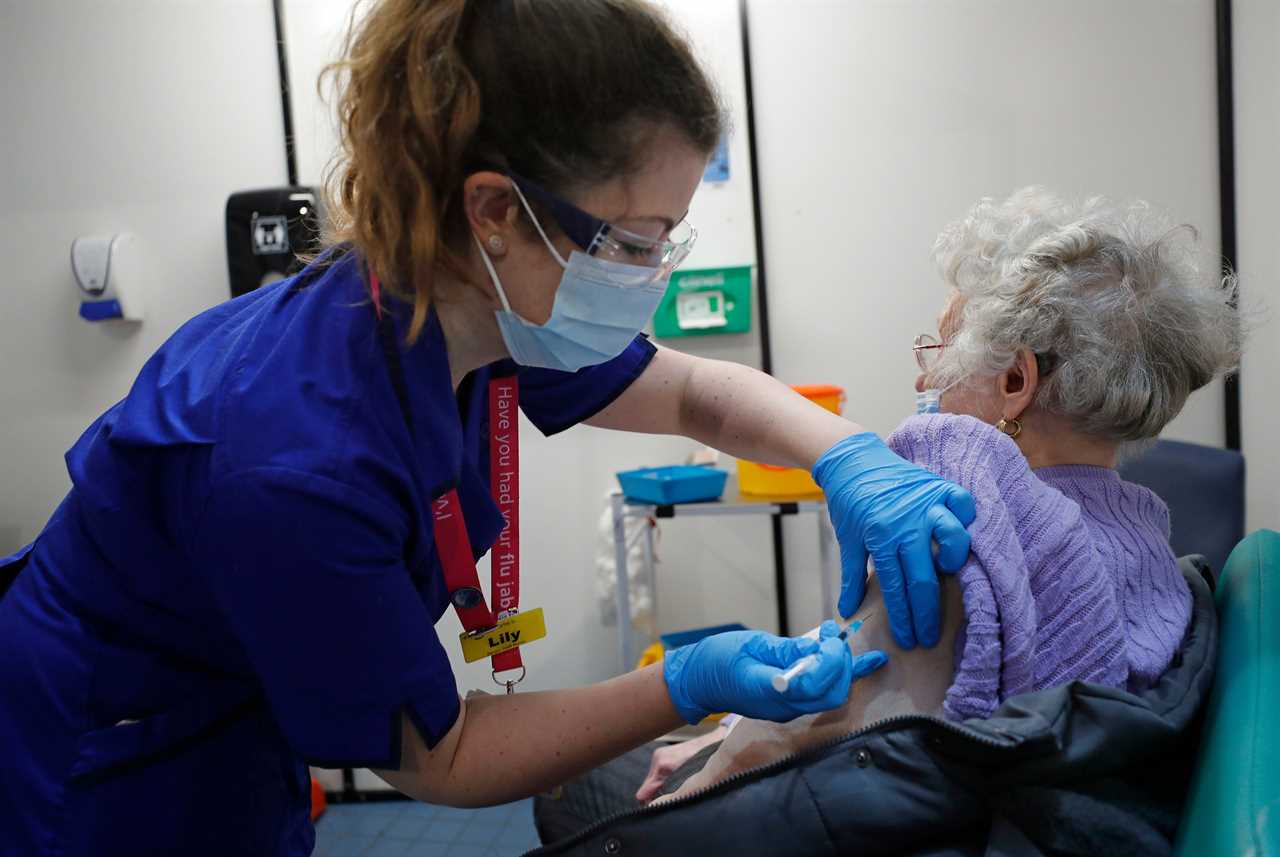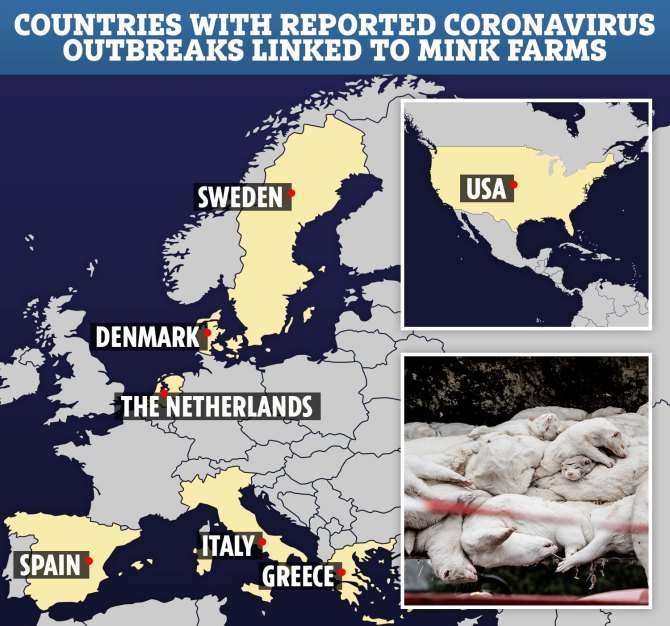A NEW strain of Covid-19 is spreading across the UK – emerging barely a week after the vaccine was rolled out.
And as health chiefs reveal the new variant of coronavirus has caused more than 1,000 cases so far, mostly in South East England, questions have arisen over whether the vaccine can beat it.

What is the new Covid strain?
It has been named VUI – 202012/01 – the first variant under investigation in December.
It was first identified in September, according to scientists at COVID-19 Genomics UK Consortium (COG-UK), who have been working with Public Health England (PHE).
The first case was found in Kent on September 20, followed by London the next day, according to a report on behalf of COG-UK.
Now, the strain accounts for over 60 per cent of infections in London, according to Sir Patrick Vallance, the chief scientific adviser, up from 28 per cent in early November.
The South East is currently fighting an uphill battle with the disease, and has some the highest Covid cases in the UK.
The region, including London, was put under a new Tier 4 level on Sunday in response to new evidence the sprain can spread faster, in effect cancelling Christmas for millions.
Government scientists at PHE’s Porton Down lab are analysing the strain to assess how dangerous it is, but so far there is no sign it can cause more severe disease.
How fast is the new Covid strain spreading?
The new strain may be up to 70 per cent more transmissible, according to early analysis.
Prime Minister Boris Johnson told Britons at a Downing Street briefing on Saturday night the new strain could increase the R rate by 0.4 or more.
The R rate is how many people an infected person passes the disease on to, and is currently 1.1 to 1.2. It must be kept below 1 in order for the outbreak to shrink.
Sir Patrick said the variant, which was thought to have emerged in mid-September in London or Kent, had a “significant substantial increase in transmissibility”.
“It moves fast and is becoming the dominant variant”, he said, adding that the strain was becoming the “dominant” one in the UK.
Professor Chris Whitty, chief medical officer for England, said the UK has informed the World Health Organisation that the new variant coronavirus can spread more rapidly.
He said the New and Emerging Respiratory Virus Threats Advisory Group (NERVTAG), a sub-group of SAGE, “now consider that the new strain can spread more quickly”.
Prof Whitty said: “Given this latest development, it is now more vital than ever that the public continue to take action in their area to reduce transmission.”
It comes after the Health Secretary Matt Hancock told MPs on December 14 the variant may be fuelling the “faster spread” in South East England.
The numbers of cases linked with the latest strain are growing “rapidly”, Mr Hancock said, as he urged everyone to stick to the Covid restrictions.
The strain has now been detected across “many regions” in England, Dr Susan Hopkins, of Public Health England, told Sky’s Sophy Ridge on Sunday.
“It has also been detected in Wales, in Scotland, we have not had any detected in Northern Ireland”, she said.
The new variant is “effectively seeded” across Wales and was a factor in the rapid rise of cases there, the country’s health minister Vaughan Gething told BBC News on Sunday.
Although only 1,000 have been confirmed as caused by this strain, there will be many more undetected.
The variant has the ability to spread faster than the Spanish one that spread over the UK in the summer, Professor Nick Loman, one of the scientists at COG-UK.
How dangerous is it?
Despite warnings that the new strain is fuelling the spread of coronavirus, experts have said there is no evidence it can cause more severe disease or death.
Prof Whitty said that “urgent work” was under way to confirm this and warned that it was “more vital than ever” that people continued to take action to reduce the spread of the virus.
However, if the virus spreads faster it will be harder to control. It will also cause more hospital admissions and deaths as a result of more cases.
The Health Secretary admitted yesterday the virus strain was “out of control”, and that Tier 4 restrictions may be needed for “some time” to control it – possibly months.
Independent scientists have raised concerns about the ability of the virus to spread faster, saying the new restrictions were necessary.
Prof Peter Openshaw, past-President of the British Society for Immunology and Professor of Experimental Medicine at Imperial College London, said: “The information that the government has just issued about this new variant coronavirus is of great concern. It is right to take it seriously.
“The doubling time is now at just six or seven days so it is really vital that we get this under control.”
Dr James Gill, Honorary Clinical Lecturer, Warwick Medical School, said: “To be very clear, delaying introduction of new restrictions whilst we gather further data on this new strain will cost lives.”
Paul Hunter, a professor of Medicine, University of East Anglia, said an increase of 0.4 in R rate was “extremely bad news”.
COG-UK said the biggest concern is any changes that lead to an increase in reinfections or vaccine failure.
Will the Covid vaccine work against the new strain?
The vaccine being rolled out in the NHS – from Pfizer and BioNTech – would not have been tested to see if it protects against this new strain.
And Professor Chris Whitty, the Chief Medical Officer for England, admitted in the long term, mutations can make the virus resistant to the vaccine.
But all Covid-19 jabs that have been developed focus on the same target – the spike protein on the surface of the virus.
The spike is what the virus uses to latch onto human cells, invade and replicate.
It cannot be ruled out that if a new mutation of the virus that changes this spike, it would affect the efficacy of a vaccine.
If the spike looks different in appearance, the body may not recognise it as Covid-19, and quickly mount an immune response.
Professor Loman revealed the new strain has 17 mutations which makes it unique, which is “striking”.
But the Health Secretary said it was “highly unlikely” the new strain would make the vaccine ineffective – which other experts agreed with.
Scientists have weighed in to say that if needed, changing the vaccine would not be a difficult task.
New flu vaccines have to be developed every year because the “predominant” strain changes annually.
Calum Semple, a professor of outbreak medicine, University of Liverpool, told BBC Breakfast last week: “The new vaccines are essentially like emails we send to the immune system. They are very easy to tweak.”
Scientists at PHE will be growing cultures of the strain in lab to see how the vaccine might impact it and to get a full picture of what it means.
What was the mink strain of Covid?
It’s not the first time the UK has been warned of a new Covid strain.
Most recently strains of the coronavirus discovered in farmed mink threatened Europe’s fight against the deadly disease.
Minks in Denmark were infected with the virus that causes Covid-19 following exposure from infected humans.
The World Health Organization said coronavirus strains infecting minks, which are subsequently transmitted to humans, may have acquired “unique combinations of mutations”.
Six countries – Denmark, the Netherlands, Spain, Sweden, Italy and the US – have reported the virus in farmed minks, dating back as far as June.
It triggered the cull of millions of farmed mink in Denmark after authorities found genetic changes they said might undermine the effectiveness of Covid-19 vaccines.

What other mutant Covid strains are there?
When news of the new strain first broke, scientists told Britons to “keep calm” because new variants emerge all the time.
There are tens of thousands of mutations since the virus first emerged a year ago.
But as more information became clear, Dr Jeffrey Barrett, director of the Covid Genomics Initiative at the Wellcome Sanger Institute, said: “This new variant is very concerning, and is unlike anything we have seen so far in the pandemic.”
British scientists are monitoring 4,000 deadly strains of coronavirus already
Scientists from UCL, along with experts from Cirad, the Universite de la Reunion and the University of Oxford, recently published a review of strains that have been discovered so far.
They analysed a global dataset of virus genomes from 46,723 people, collected up until the end of July 2020.
The teams have so far identified 12,706 mutations in Sars-Cov-2 – the proper name for the coronavirus.






